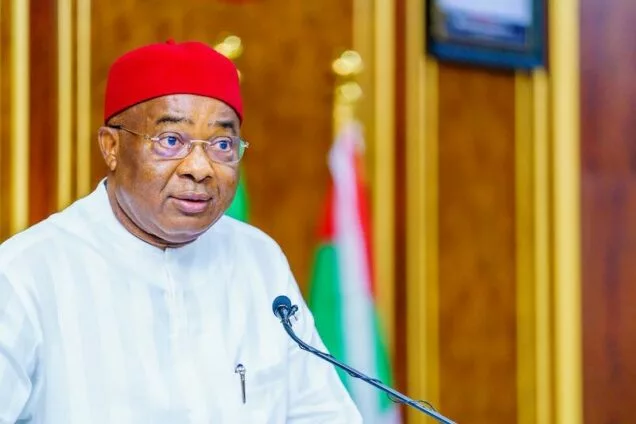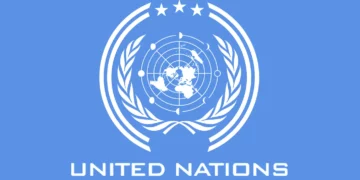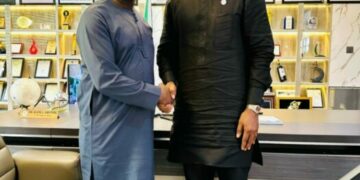Imo State governor, Senator Hope Uzodimma, has said that editors and media leaders must be held accountable for the strength of Nigeria’s democracy, the integrity of its elections, and the level of public trust ahead of the 2027 general polls.
Delivering the keynote address at the 2025 All Nigeria Editors Conference (ANEC) held at the State House Conference Centre, Abuja on Wednesday, the governor said the press cannot claim neutrality in shaping democratic outcomes, stressing that “editors are not spectators but catalysts” in the preservation of national unity and electoral credibility.
The conference, themed “Democratic Governance and National Cohesion: The Role of Editors,” featured a sub-theme on “Electoral Integrity and Trust Deficit: What Nigerians Expect in 2027.”
Uzodimma said both topics are inseparable and directly tied to the professional conduct of editors. “If you have a role to play in democratic governance and national cohesion, then you also have a role to play in electoral integrity and trust deficit,” he said. “Without electoral integrity, there can be no democracy. Electoral integrity begets democracy, and democracy begets good governance.”
He noted that editors wield immense power to influence national perception, and their framing of political events often determines whether citizens see progress or decline. “Editors are powerful influencers of society because they wield the most powerful weapon on earth — the pen,” he said. “You decide what becomes urgent and what disappears, what gets amplified and what fades into silence.”
Uzodimma urged editors to exercise their power with a deep sense of responsibility, arguing that objectivity in journalism must go beyond mechanical neutrality to an ethical and intellectual duty.
“Objectivity is not the mere transcription of events. Every editorial choice — what story leads, which voice dominates — is interpretative,” he said. “Objectivity must be guided by national cohesion and editorial integrity.”
The governor lamented what he described as the “trust deficit” between the public and the media, citing findings from the 2023 Edelman Trust Barometer, which showed that only 51 per cent of Nigerians trust the media.
“That means nearly half of Nigerians actively distrust what the media reports,” he said. “This is an institutional crisis. It reveals distrust in both government and the Fourth Estate — the very institutions meant to inform and govern.”
He warned that sensational and divisive coverage ahead of the 2027 elections could further weaken democracy and public faith in the system. “When your coverage consistently treats political disagreement as existential conflict, when every policy debate becomes a battle, every election a crisis, you train citizens to see democracy as failing,” Uzodimma said.
According to him, editors’ framing of electoral issues during the 2023 general elections contributed to public perceptions of irregularities and distrust. “Under the guise of calling election results from a few polling units, credibility was undermined,” he said.
“If your coverage leads citizens to believe elections are fundamentally rigged, turnout drops, legitimacy erodes, and democracy weakens, regardless of what actually happened at polling units.”
He cautioned editors against allowing commercial or political pressures to dictate editorial direction. “Engagement metrics reward sensationalism — division drives clicks, outrage drives sales — but professionalism is tested within constraints, not in their absence,” the Governor noted.
Uzodimma called for greater commitment to factual, contextual, and nation-building journalism, urging editors to prioritise accuracy over speed, verification over virality, and context over clickbait. “National interest must be your editorial north star,” he said. “Coverage should inform without inflaming, hold power accountable without treating every contest as catastrophe.”
The Imo governor said electoral integrity begins with editorial integrity, warning that the spread of unverified information or tribal narratives can compromise elections before ballots are even cast. “If misinformation and rumour masquerade as journalism, electoral integrity is already compromised,” he said. “You shape the information environment in which citizens form opinions and reach judgments.”
On national cohesion, Uzodimma commended the media’s role in exposing corruption and amplifying marginalised voices but urged editors to balance watchdog journalism with nation-building.
“You report division, but you can also choose to highlight shared values and common purpose,” he said. “Your editorial choices determine whether readers see politics as tribal conflict or democratic competition.”
He cited recent economic indicators — including the oversubscription of Nigeria’s Eurobond and increased investor confidence — as examples of stories that demonstrate stability and progress. “When you amplify facts that show reforms are working, you build confidence and inspire hope,” Uzodimma said. “That’s journalism in the service of nation-building.”
Uzodimma commended President Bola Tinubu’s presence at the conference as a signal of his administration’s respect for the media and commitment to transparency.
He said structures such as the National Orientation Agency (NOA) and ministerial briefing series were designed to promote openness and prevent misinformation.
“You are not spectators in 2027,” Uzodimma told the editors. “You are active participants. The narratives you shape between now and the election will determine whether Nigerians approach 2027 with hope or cynicism, with trust or suspicion.”
He reminded journalists of their constitutional place as the Fourth Estate of the Realm — a vital pillar of democracy whose influence will be judged by history. “Even in the modern age, you are the last man standing,” he said. “History will critique how the media, not just government, helped to make or mar Nigeria in 2027. The choice is yours.”





